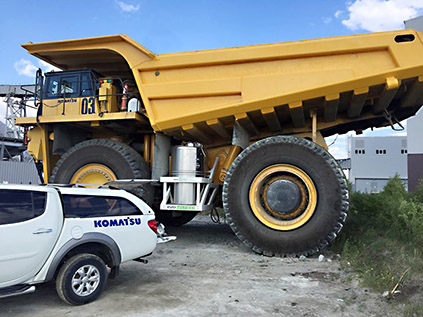Protection and Control
The EVO-MT® System includes a powerful Electronic Control Unit (ECU) that monitors critical engine, chassis and system data and uses this information to dynamically control the operating fuel mode of the engine. The ECU also provides sophisticated engine protection and monitoring functionality with pre-alarm, alarm and shut-down logic that allows the engine to be switched from NG+D® mode to diesel-only operation seamlessly and automatically. These protective systems and control algorithms ensure continued engine reliability and uptime when operating on LNG. The ECU monitors critical engine parameters via the systems own sensors or the engine's CANbus including exhaust gas temperature, manifold air temperature, vibration, engine coolant temperature, engine speed, compressor inlet pressure and manifold air pressure. Each ECU data channel is sampled 50 times per second (50 Hz) ensuring rapid detection and correction of anomalies.
On-Board LNG Storage
LNG is safely and securely stored onboard the mine haul truck using a fully-integrated chassis system. The LNG storage “module” includes a single, double walled, vacuum insulated 279 US Gallon (usable) cryogenic tank, LNG vaporizer and cryogenic safety controls and sensors. The module is a fully-engineered, pre-fabricated assembly that significantly minimizes the required installation down-time of the truck. Modules are shipped to the mine site completely assembled and tested and can be installed using a fork lift. The LNG moduled is designed specifically for the Komatsu 730 haul truck carries sufficient LNG storage capacity for a 12 hour refueling cycle. Installation of the fuel storage module and other non-engine related equipment will typically require 1 to 2 shifts to complete.
LNG Refueling
The LNG storage module is equipped with a Fuel Control Box containing an LNG fueling receptacle, a tank pressure gauge and a manual tank vent valve. LNG refueling is performed using a pressurized, quick-disconnect coupling that allows for the safe and rapid refueling of the module. LNG refueling can be done in parallel with diesel refueling using either permanent, semi-permanent or mobile cryogenic fuel transfer systems.
Gas Regulation and Control
Gas is delivered from the vaporizer to a gas train located on the trucks upper deck and housed in a specially designed housing to protect it. Included are a high pressure regulator, low pressure regulator and solenoid valve as well as safety controls and sensors.
Engine Related Components
The EVO-MT® System allows for the in-frame conversion of the haul truck engine to LNG+D operation. The conversion process utilizes components that are installed externally of the engine and no changes or modifications to the cylinders, pistons, fuel injectors or cylinder heads are required. Retaining the OEM diesel fuel system in its entirety, the engine maintains the capability to operate solely on diesel fuel when required. The System interfaces with the engine cooling circuit in order to supply high temperature coolant to a heat exchanger / vaporizer for efficient conversion of the LNG from a liquid to a vapor state. Once the LNG is converted to a vapor phase, it is supplied to the engine’s air-intake system at a point upstream of the turbo-compressor inlets using low restriction air-gas mixing technology. Installation is performed using conventional shop tools and equipment and requires approximately one shift to complete.
Telematics
Every EVO-MT® System is equipped with GFS Corp's proprietary telematics system, EVO Connect®. EVO Connect provides near real-time engine and system data via a web portal or a proprietary Apple iPad application. System status and fault codes allow users to diagnose system problems remotely so technicians are prepared before getting access to the truck.
Graphical User Interface
The GUI allows for quick and simple access to both real time system data using a proprietary graphical user interface (GUI) program. The GUI program is PC compatible and technical personnel can access system data using a convenient USB interface located in the operator cab. In addition to accessing system data, the GUI program is utilized during setup and commissioning of the haul truck for creation or loading of fuel mapping algorithms as well as for programming various system controls, pre-alarm and alarm setpoints.





